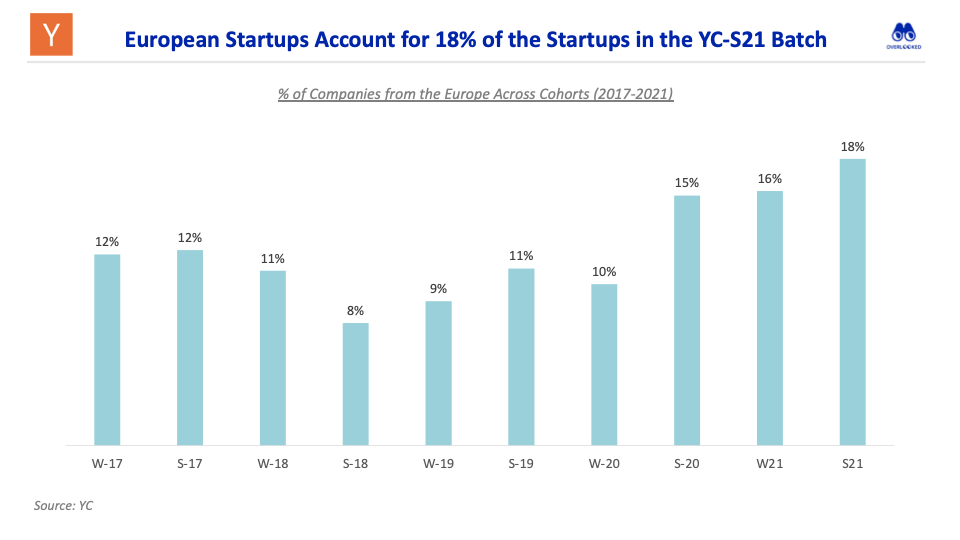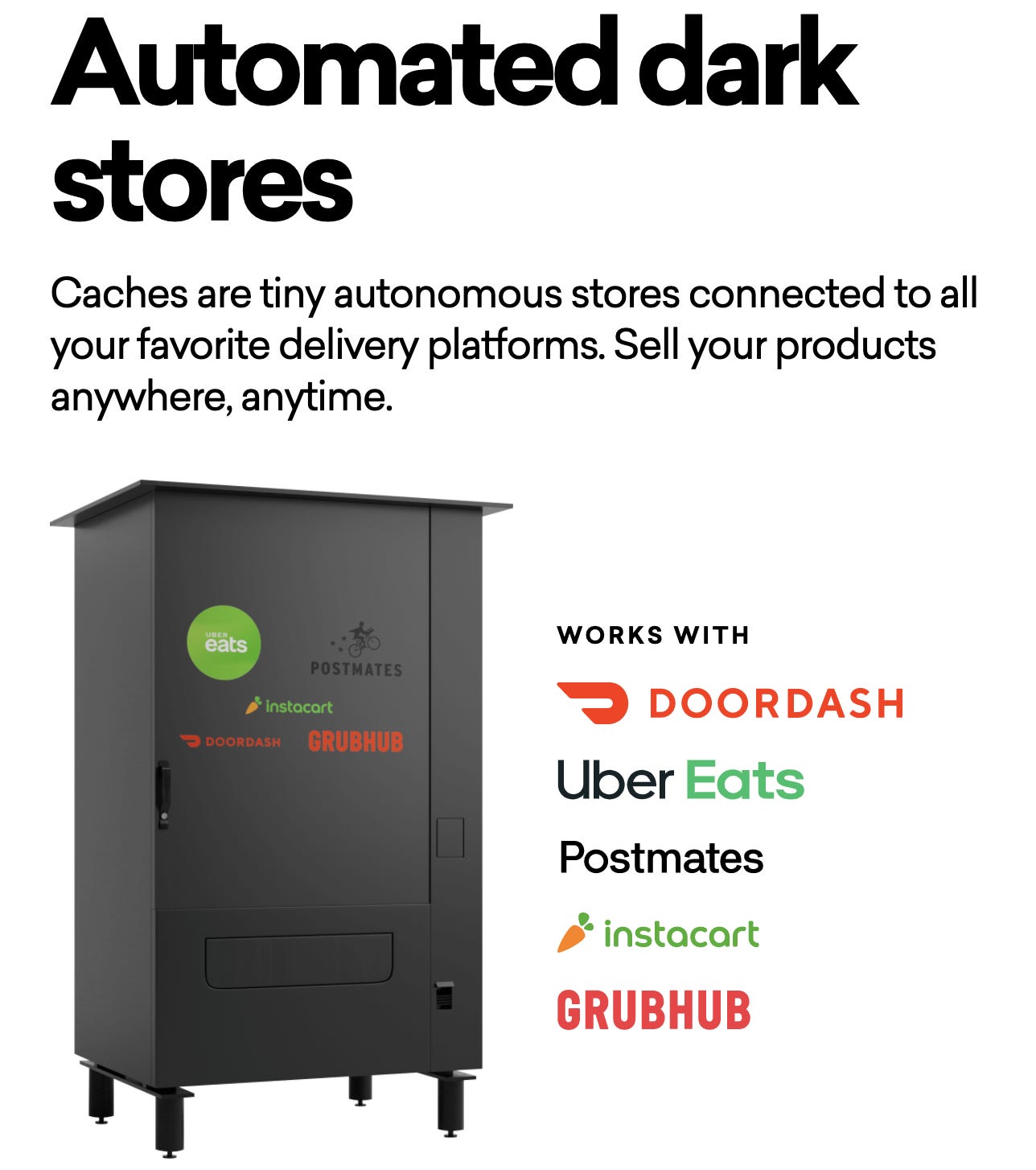🗺 Y Combinator - Summer Batch 2021
Overlooked #79
Hi, it’s Alexandre from Eurazeo (ex. Idinvest). I’m investing in seed & series A consumer and consumer enablers startups all over Europe. Overlooked is a weekly newsletter about venture capital and underrated consumer trends. Today, I’m digging into YC’s most recent batch to spot recurring tech trends from the 350+ participants.
I used to screen all the startups participating in YC-batches. It has become impossible for the two last batches with the number of startups per batch jumping from 200+ to 300+. Instead, I'm now skimming the YC directory for startups in the sectors I'm interested in.
In this newsletter, I'll share 8 trends I saw in the YC-S21 batch: grocery, SaaS for local businesses, e-commerce, climate tech, tools for sales & customer support, productivity, no-code and embedded finance.
As a preamble, below are some charts illustrating the evolution of YC-batches overtime. TL;DR: more startups, more foreign startups, more European startups and 4 main sectors targeted by YC which are B2B software, consumer, healthcare and finance.
Theme 1: Grocery
With covid, grocery online penetration has increased significantly (8.3% in Mar. 20 vs. 14.3% in Mar. 21 in the U.S.). It generated a renewed interest for the sector from both entrepreneurs and investors. In the latest YC batch, many trends that I observe in this category are represented: farm to table, convenience, recipe-based grocery shopping, dark kichen, subscription, food waste.
On food waste, Perfekto is building an Imperfect Foods / Misfit Market for Latam. Consumers can subscribe to a weekly box of fruits and vegetables that would have otherwise been wasted because they are imperfect (too big, too small, off-beat, etc.). In Latam, 54% of fruits and vegetables are thrown away due to aesthetics and supply chain inefficiencies.
On farm to table, Membo in Estonia and Locale in the U.S. are both sourcing products directly from farmers and selling them conveniently to end consumers. Consumers are delivered locally on the same day every working day which is a way to aggregate orders to smooth the logistics supply chain and achieve better unit economics for both farmers & consumers. Locale has delivered 15k orders and is working with 70 suppliers (both farms and small businesses). Membo has delivered 4k orders to 2.5k consumers and has 1k SKUs from 60 producers.
On dark kitchens, MayaEats is leveraging a network of restaurants with underutilized kitchen capacity to operate delivery only brands. Maya has 8 brands, has launched 60 digital stores, has processed 53k orders for $1.85m in GMV and $375k in revenues. Byte Kitchen allows restaurants to scale their brands generating royalties on their IP without investing in both Capex and Opex. It's a fully-managed offering similar to what DoorDash has recently launched with DoorDash Kitchens Full Service. MadEats (Philippines) and Nino Foods (India) are building a portfolio of delivery only brands similar to what Taster and Curb have been building in Europe.
On convenience, two former employees at DoorDash launched Cache (US) which are online convenience stores available on delivery platforms (DoorDash, UberEats, Postmates and Instacart) and leveraging automated dark stores (sort of vending machines optimized for deliveries).
On recipe-based shopping, Kitchenful (Germany) is an app to simplify your grocery shopping by filling automatically a grocery cart based on recipes that you want to cook in the coming days. Kitchenful is partnering with Amazon, Gorillas, Rewe and Edeka to fulfill the orders. It has raised a $1m pre-seed round from YC and prominent angels (e.g. Valentin Stalf at N26).
Theme 2: SaaS for Local Businesses
Another rabbit hole I’m currently digging into with two colleagues at Eurazeo (poke Clément and Loup) are SaaS for local businesses such as restaurants, auto shops, hotels, beauty services, etc. In this space, I’m much more excited by verticalized players (e.g. Toast building the ultimate SaaS for restaurants) compared to horizontal ones (e.g. Yext setting up a software for presence management for all small businesses). I wrote a paper here on the topic (send me an email at adewez@eurazeo if you have feedbacks/want to chat about this space).
In this batch, I was impressed by the number of vertical SaaS tackling the restaurant industry. SliceQ and Bite Ninja are automating or outsourcing food ordering. Atlas is building a Shopify for restaurants. Orderli is building a QR-code based onsite ordering and payment system - similar to what our portfolio company Sunday is offering. Outloud is improving the performance of frontline workers in the restaurant industry by recording their interactions with customers (e.g. suggesting them upsells in real times, preventing order errors, etc.).
Obviously, I also found startups tackling other small businesses such as Outfit for fitness coaches (providing them with physical spaces and a software to run their activity) or OneShop for semi pro and professional fashion resellers (all-in-one app to list items across several platforms and to manage all your listings efficiently).
Theme 3: E-commerce
With covid, e-commerce is the other tech sector which made a come-back together with grocery. In this YC-batch, many trends in e-commerce are represented: personalization, no-code, faster checkout, social shopping, etc.
Two startups are offering one-click checkout solutions similar to Fast or Amazon one click payment. Arrow is doing it in Southeast Asia for Arrow-enabled online stores. Sleek is doing it in the Western world with two tricks: (i) its a browser extension which makes the solution available on every online store, (ii) it offers cash-back to hook new users.
Similarly to Shogun, Alchemy is building a no-code platform to build e-commerce frontends on top of Shopify's headless solution. It's a great way to go deeper into your Shopify's store customization without having to hire a tech team.
At the intersection between no-code and ecommerce, there is another company called Monto which is building a suite of apps (reviews, abandoned carts, subscription, multi-currency, CRMs) to upgrade your Webflow (a super popular no-code horizontal platform) e-commerce experience.
I do like Varos which is a collaborative data platform for merchants. You submit your e-commerce data to Varos and in exchange, you get access to benchmarks and recommandations based on all the data gathered from the merchants which are Varos' customers.
Theme 4: Productivity
Personal and professional productivity tools are also well represented in the YC current batch. I’ll start with Hera (I admit I’m super biased). Louise and Bruno have joined this batch to make you much more productive during your meetings. SigmaOS is building a web browser specifically custom-based to be more productive at work. Beeper is an app aggregating all your conversation apps into a single interface. Synth is using AI to summarize automatically videos and meetings. You have also two products to fight addictions: alcohol for Reframe and phone/computer overuse by millennials for Atmana.
Theme 5: Embedded Finance
I continue to dig into embedded financial solutions which empowers any company to become a fintech enabled business. In the current YC batch, several startups are innovating around this topic.
Union54 is building a Stripe Issuing for Africa - enabling any business to offer a bank account and a credit card to its customers.
Pluggy is building a Plaid for Brazil - enabling any business to access and use banking information from its customer base. YC had already backed a couple years ago Belvo (W20) which is building a Plaid for the whole Latam region.
There is also Palenca which is building a payroll API for Latam - enabling any business to access payroll data for several use cases like identity verification and credit scoring.
Another interesting company in this theme is Numary which is building a programming language to build complex payment flows (like the GMV distribution between several stakeholders in a marketplace or an in app virtual currency).
Theme 6: Climate Tech
Climate has become a serious tech topic in the past 18 months with both entrepreneurs and investors pulling large resources into the space.
After Pachama (W19) and Wren (S19), YC has another carbon offsetting startup in its current batch called Abatable which is building a robo-advisor that will automatically build a great portfolio of carbon offsetting projects for its customers.
Before offsetting carbon emissions, it's key to measure them. This is what Carbonfact (France) is building for consumer products. It’s an engine to compute the carbon footprint of any product based on its characteristics as well as API to distribute this info wherever the brand needs it.
YC is also backing more deep tech projects related to climate like Feveret (U.S.) which is a liquid cooling technology to decrease the cooling costs and to improve the performance of data centers as well as Heimdal (UK) which is a carbon neutral concrete.
Theme 7 - Verticalised Tools for Sales and Customer Support Teams
Many startups are building solution to transform the full sales cycle and make it much more efficient.
Laudable is a tool to capture and share customer success stories through videos to help you generate more marketing leads and to increase your sales conversion rate. Storylane lets SaaS products craft self served and interactive product demos that they can send to potential leads.
Hotswap and One Schema are both accelerating the onboarding of new customers. Hotswap makes it easy to onboard a customer which is migrating from a competitor while One Schema reduce the pain point of importing and cleaning CSV to your populate your product with customer data.
On the customer support's section of the sales value chain, Dots helps you manage your customer community either on Slack or on Discord while Breadcrumbs scores your existing customer base to identify potential upsell revenue opportunities.
Theme 8 - No-Code
No code has become a super buzzy word in tech. The idea is basically to empower non technical people to build and do things that would have been impossible before without coding. I suspect many startups will brand themselves as no code tools because there is a strong community of early adopters amongst no-coders, i't’s is a great way to get your first users/customers.
In the YC-batch, certain no-code startups are going after a certain job function like (i) Lago for growth teams to bypass engineers to build the data pipeline needed to measure the performance of their growth campaigns or (ii) Beau for customer support teams to build no-code client workflow for recurring client-facing tasks.
Others are smoothing the process of building data pipelines and data visualizations like Whaly (combining in a unique platform accessible by non technical people an ETL, a data warehouse and a data visualisation tool) and Whalesync (specifically targeting heavy users of no-code tools like Airtable & Webflow).
Thanks to Julia for the feedback! 🦒 Thanks for reading! See you next week for another issue! 👋









